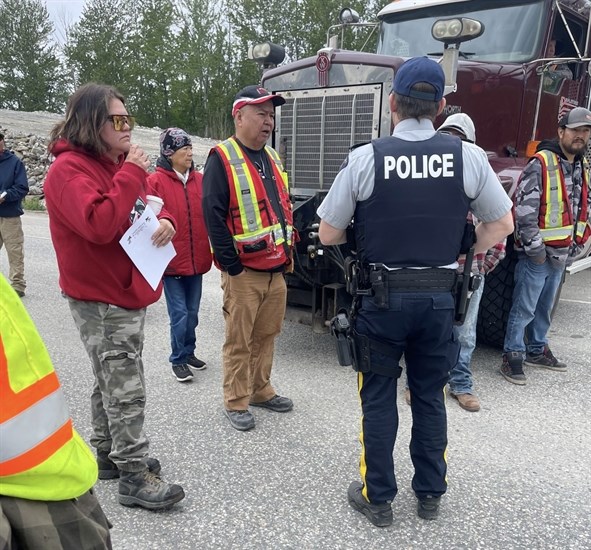First Nations blockade Trans-Canada bridge in Sicamous claiming broken promises
Splatsin First Nation said broken promises to include Indigenous workers in the project to rebuild the bridge in Sicamous are why the bridge has been blockaded Monday.
The $260-million project to replace the R.W. Bruhn Bridge on the Trans-Canada Highway included a deal for Indigenous participation in the project, but Splatsin said Indigenous workers and companies have been exploited, according to a press release from the nation issued, May 12.
“We are deeply disappointed and angered by how our people and our development corporation have been treated. What we’re seeing isn’t just a few broken promises—it’s a deliberate pattern of gaming the system,” Splatsin’s Kukpi7, chief, Mike Christian said in the release
Dump trucks are blocking the crossing in a call for action. Detours are available on the normal construction detour route via Highway 97A and Highway 97B and local access to Sicamous is still open.
The CEO of Splatsin Development Corporation, Grahame Go, said the contractors for the bridge project, Aecon Group Inc. and Emil Anderson Group, are taking advantage of a system meant to work towards reconciliation.
“We were promised opportunity,” Go said in the release. “Instead, we’ve been met with exclusion and deception. They used our name to win the bid. Now they’ve tossed us aside. It’s insulting, unethical, and completely contrary to the spirit of reconciliation.”
Grahame said the blockade will be lifted if all parties can agree to honour the agreement for Indigenous participation in the bridge construction.
“Our demand is simple,” Go said. “Clear, documented accountability that respects the role of Splatsin Development Corporation–Yucwmenlúcwu and ensures full and fair participation in this project—now and moving forward.”
READ MORE: New bridge construction in Sicamous not impacted by fatal semi crash
Splatsin Development Corporation was supposed to get years of work, but several Secwépemc bands including Adams Lake, Neskonlith, Skwlax te Secwépemcúlecw and Splatsin have said that Aecon and Emil Anderson have not followed through.
“This was presented as a two-year opportunity. Instead, they’ve given us just three months of meaningful work,” Go said. “We entered this agreement in good faith. What we’ve experienced instead is corporate opportunism—exploiting our partnership for their benefit and then sidelining us to cut costs. This isn’t reconciliation; it’s exploitation.”
Neskonlith Kukpi7, chief Irvin Wai said the blockade isn’t about preferential treatment.
“We are not asking for special treatment—only for fair and transparent access to opportunities that impact our land and our people. We hope that by continuing to bring attention to these issues, we will begin to see positive and inclusive outcomes for all First Nations communities,” he said in a press release in support of the Splatsin blockade.
The bands said the Aecon and Emil Anderson have been excluding qualified Indigenous workers, reserving undesirable jobs for Indigenous crews, allowing employees to self-identify as Indigenous without verification, and more.
Subcontractors were supposed to buy fuel from the Splatsin gas station Quilakwa Fuel, but unionized Teamsters weren’t informed about the agreement. There have been last minute, even late night shift cancellations with little or no explanation. The Splatsin Development Corporation’s trucks were removed from the project even though there was a deal to split the trucking work.
The contractors also removed an emergency medical services truck that was operated by the Splatsin Development Corporation even though there was a signed agreement.
Jeromy Schuetze is the senior project manager of Yucwmenlúcwu’s Civil Construction Division and he said the exclusion of workers isn’t an accident or the result of typical issues with large scale construction projects.
“These aren’t simple scheduling issues—they’re systemic barriers being used to push us out, all while the partnership claims to be honouring reconciliation. It’s a clear example of profit being placed ahead of people,” Schuetze said in the release. “Even with all this, our crews have remained patient and committed. But the constant last-minute changes and lack of transparency are taking a toll. They erode trust and create uncertainty around job security. It’s not just frustrating—it’s unjust.”
The bridge project is on an archeological zone where thousands of artifacts have been recovered since 2022, and Sicamous itself is a traditional territory for the Splatsinac.
Splatsin is the southern most Secwépemc band and a member of the Shuswap Nation Tribal Council. Profits from the development corporation are reinvested in the Splatsin community.
iNFOnews.ca reached out to the RCMP, Ministry of Transportation, Aecon Group Inc. and Emil Anderson Group for comment.
In a written statement, the ministry said it's aware and continues to monitor the situation with hope the parties can work through the challenges. It advised drivers to check the status of the highway at DriveBC.
Emil Anderson responded with a "no comment".
RCMP and Aecon Group didn't respond to requests for comment.
To contact a reporter for this story, email Jesse Tomas or call 250-488-3065 or email the editor. You can also submit photos, videos or news tips to the newsroom and be entered to win a monthly prize draw. Find our Journalism Ethics policy here.
We welcome your comments and opinions on our stories but play nice. We won't censor or delete comments unless they contain off-topic statements or links, unnecessary vulgarity, false facts, spam or obviously fake profiles. If you have any concerns about what you see in comments, email the editor in the link above. SUBSCRIBE to our awesome newsletter here.




